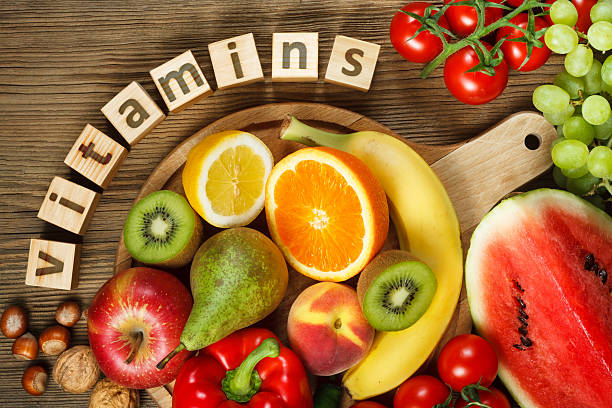
Vitamins are essential nutrients that your body needs to function properly and stay healthy
Prof Dr. Abdullah G Arijo
When we talk about nutrition and food, we usually focus on carbohydrates, lipids, and proteins and often overlook the importance of vitamins and minerals. Vitamins are essential nutrients that are present in the food we consume. Our body needs these nutrients to carry out vital functions such as metabolism, producing blood cells, and building bones. Vitamins are categorized into two types: water-soluble and fat-soluble.
Water-soluble vitamins, such as vitamin C and B vitamins, circulate through the body without being stored. These vitamins are crucial for energy metabolism, nerve function, immune system health, and the production of red blood cells. They can be found in a variety of foods including fruits, vegetables, grains, legumes, nuts, seeds, milk, and meat.
Fat-soluble vitamins are stored in the body’s cells and can reach toxic levels if you get more than you need. They include vitamins A, D, E, and K. They are needed for vision, healthy skin, bone growth, blood clotting, and antioxidant protection. They are found in animal products, fortified foods, vegetable oils, and green leafy vegetables.
 To maintain good health, it is important to know the types of vitamins, their food sources, and potential issues that may arise if they are not consumed
To maintain good health, it is important to know the types of vitamins, their food sources, and potential issues that may arise if they are not consumed
Getting enough vitamins is crucial for human health as they assist in performing various functions that are essential for life. Inadequate vitamin intake from one’s diet can lead to vitamin deficiency, which can trigger several symptoms and illnesses. For instance, vitamin A deficiency can result in night blindness, vitamin C deficiency can cause scurvy, and vitamin D deficiency can lead to rickets. Therefore, it is important to have a balanced and diverse diet that provides adequate vitamins to meet your body’s needs. If you have specific dietary limitations or conditions that affect your vitamin intake, you may need to take supplements. To maintain good health, it is important to know the types of vitamins, their food sources, and potential issues that may arise if they are not consumed.
Vitamin A: beef, liver, eggs, shrimp, fish, fortified milk, sweet potatoes, carrots, pumpkins, spinach, mangoes
Vitamin B1 (thiamin): pork chops, brown rice, ham, soymilk, watermelon, acorn squash
Vitamin B2 (riboflavin): milk, eggs, yogurt, cheese, meats, green leafy vegetables, whole and enriched grains, and cereals
Vitamin B3 (niacin): meat, poultry, fish, fortified and whole grains, mushrooms, potatoes, peanut butter
Vitamin B5 (pantothenic acid): chicken, whole grains, broccoli, avocados, and mushrooms
Vitamin B6: meat, fish, poultry, legumes, tofu and other soy products, bananas
Vitamin B7 (biotin): whole grains, eggs, soybeans, and fish
Vitamin B9 (folate): fortified grains and cereals, asparagus, spinach, broccoli, legumes, orange juice
Vitamin B12: meat, poultry, fish, milk, cheese, fortified soymilk and cereals
Vitamin C: citrus fruit, potatoes, broccoli, bell peppers, spinach, strawberries, tomatoes, Brussels sprouts
Vitamin D: fortified milk and cereals, fatty fish
Vitamin E: vegetable oils, leafy green vegetables, whole grains, nuts
Vitamin K: cabbage, eggs, milk, spinach, broccoli, kale
Vitamins are essential nutrients that your body needs to function properly and stay healthy. If you don’t get enough vitamins from your diet or supplements, you may develop various health issues depending on which vitamins are deficient. Some of the common signs and symptoms of vitamin deficiency are:
Fatigue and weakness: This may be caused by low levels of vitamin D, vitamin C, or any of the B vitamins, which are involved in energy production and metabolism. Folate deficiency can also cause anemia, which reduces the oxygen supply to your tissues and organs.
Dry skin and hair: This may be caused by low levels of vitamin A, vitamin E, vitamin C, or biotin, which are important for skin and hair health and repair. Biotin deficiency can also lead to brittle, thinning, or splitting hair and nails.
Depression: This may be caused by low levels of vitamin D, vitamin B12, or folate, which are involved in mood regulation and brain function. Vitamin B12 and folate deficiency can also cause nerve damage and cognitive impairment.
Easy bruising or bleeding: This may be caused by low levels of vitamin C, vitamin K, or vitamin B12, which are essential for blood clotting and wound healing. Vitamin C deficiency can also cause scurvy, a disease characterized by bleeding gums, loose teeth, and joint pain.
Bone fractures: This may be caused by low levels of vitamin D, vitamin K, or calcium, which are important for bone health and density. Vitamin D deficiency can also cause rickets in children, a condition that leads to soft and deformed bones.
Skin color changes: This may be caused by low levels of vitamin B3, vitamin B6, or vitamin B12, which are involved in skin pigmentation and red blood cell production. Vitamin B3 deficiency can cause pellagra, a disease marked by dermatitis, diarrhea, and dementia. Vitamin B6 deficiency can cause seborrheic dermatitis, a skin condition that causes scaly patches and dandruff. Vitamin B12 deficiency can cause pernicious anemia, which can make the skin pale or yellowish.
[The content presented in this article has been collected from multiple sources]
____________________
 Prof. (R) Dr. Abdullah G. Arijo is Advisor and Visiting Professor, SBBUVAS, Sakrand, Pakistan. He is Ex-Chairman, Department of Parasitology, Sindh Agriculture University and Ex-Advisor Academics & P&D to Vice Chancellor SAU Tandojam
Prof. (R) Dr. Abdullah G. Arijo is Advisor and Visiting Professor, SBBUVAS, Sakrand, Pakistan. He is Ex-Chairman, Department of Parasitology, Sindh Agriculture University and Ex-Advisor Academics & P&D to Vice Chancellor SAU Tandojam
Also read: ECO-WASTE & OUR RESPONSIBILITY
Wow sir
Very Essential knowledge sir
Романтический отдых в Абхазии: уединение и красота пейзажей для влюбленных пар
отдых абхазия http://otdykh-v-abhazii.ru/ .